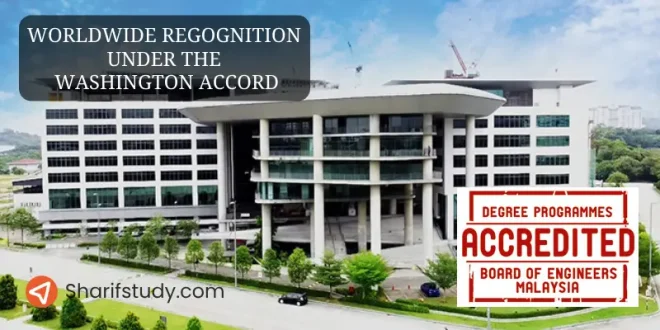Engineering Degrees Accredited under the Washington Accord
APU Engineering Degrees have been officially recognized by the Board of Engineers Malaysia (BEM), a signatory to the Washington Accord.
APU Engineering Degrees are Professionally Accredited by the Board of Engineers Malaysia (BEM), and hence accepted globally under the Washington Accord.
Under the Washington Accord, nations including Australia, Canada, China, Chinese Taipei, Costa Rica, and Hong Kong can recognize APU engineering programs.
China, India, Indonesia, Ireland, Japan, Korea, Malaysia, Mexico, New Zealand, Pakistan, Peru, Russia, Singapore, Sri Lanka, South Africa, Turkey, the United Kingdom, and the United States have all signed the agreement.
This permits APU graduates to be recognized in these countries for job prospects leading to Professional/Chartered Engineer status or additional study.
Furthermore, several nations that have not yet signed the Washington Accord utilize this as a criterion for recognising engineering degrees.
This certification assures that APU Engineering Graduates can take advantage of the following benefits in countries which have signed the Washington Accord:
Opportunities to register as a Graduate Engineer with the Board of Engineers Malaysia (BEM) or other professional organizations in nations that have signed the Washington Accord.
Pathways to become a Professional or Chartered Engineer:
- Opportunities to register as a Graduate Engineer with Board of Engineers Malaysia (BEM) or the relevant professional bodies in other countries who are signatories under the Washington Accord.
- Pathways to becoming a Professional or Chartered Engineer.
- Assurance that graduates are considered as having met international academic standards for engineering practice.
Please visit https://www.ieagreements.org/accords/washington.
The advantages listed above are valid in the following nations that are signatories to the Washington Accord:
“Signatories have full rights of participation in the Accord; qualifications accredited or recognised by other signatories are recognised by each signatory as being substantially equivalent to accredited or recognised qualifications within its own jurisdiction”
http://www.ieagreements.org/accords/washington/signatories/
Australia, represented by Engineers Australia (1989).
Canada, represented by Engineers Canada (1989)
China, represented by the China Association for Science and Technology (2016).
Chinese Taipei, represented by the Institute of Engineering Education Taiwan (2007).
Costa Rica, represented by the Colegio Federado de Ingenieros y Arquitectos de Costa Rica (CFIA) (2020).
Hong Kong China is represented by the Hong Kong Institution of Engineers (1995).
India is represented by the National Board of Accreditation (2014). (This only applies to NBA-accredited programs given by education providers authorized by NBA schools.
Indonesia, represented by the Indonesian Accreditation Board for Engineering Education (IABEE) (2019).
Ireland is represented by Engineers Ireland (1989).
Japan, represented by the Japan Accreditation Board for Engineering Education (2005).
Korea is represented by the Accreditation Board for Engineering Education of Korea (2007)
Malaysia, represented by the Board of Engineers Malaysia (2009).
Mexico is represented by the Council of Accreditation of Engineering Education (CACEI) (2016).
New Zealand is represented by the Institution of Professional Engineers NZ (1989).
Pakistan, represented by the Pakistan Engineering Council (2017).
Peru – Represented by the Instituto de Calidad Y Acreditacion de Programas de Computacion, Ingeneria Y Tecnologia (ICACIT) (2018).
Russia is represented by the Association for Engineering Education of Russia (2012).
Singapore, represented by the Institution of Engineers Singapore (2006).
South Africa, represented by the Engineering Council of South Africa (1999).
Sri Lanka, represented by the Institution of Engineers Sri Lanka (2014)
MUDEK (2011) represents Turkey, whereas Engineering Council UK (1989) represents the United Kingdom.
United States – represented by the Accreditation Board for Engineering and Technology (1989).
“Organisations holding provisional status have been identified as having qualification accreditation or recognition procedures that are potentially suitable for the purposes of the Accord; those organisations are further developing those procedures with the goal of achieving signatory status in due course; qualifications accredited or recognised by organisations holding provisional status are not recognised by the signatories”
http://www.ieagreements.org/accords/washington/signatories
Bangladesh, represented by the Institution of Engineers Bangladesh (IEB)
Chile – represented by Agencia Acreditadora Colegio De Ingenieros De Chile S A (ACREDITA CI).
Philippines – Represented by the Philippine Technological Council.Thailand is represented by the Council of Engineers Thailand (COET).
Myanmar – Represented by the Myanmar Engineering Council.
Saudi Arabia, represented by the Education and Training Evaluation Commission (ETEC).
Nigeria is represented by COREN, which oversees engineering programs.
APU Engineering Programs:
Bachelor’s Degree in Electrical and Electronic Engineering with Honours
Bachelor of Mechatronic Engineering, with Honours
Bachelor of Mechanical Engineering, with Honours
Bachelor in Computer Engineering with Honours.
Bachelor of Petroleum Engineering, with Honours.
 SharifStudy Best way to Study in Malaysia
SharifStudy Best way to Study in Malaysia




